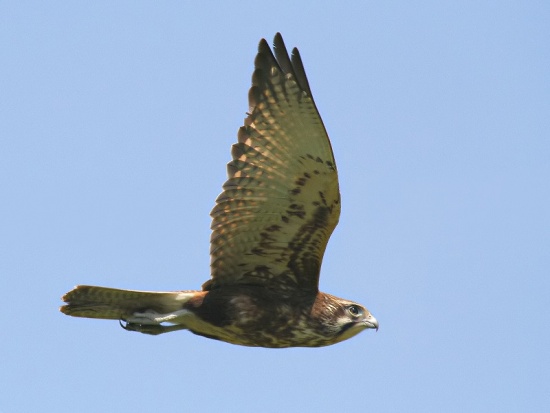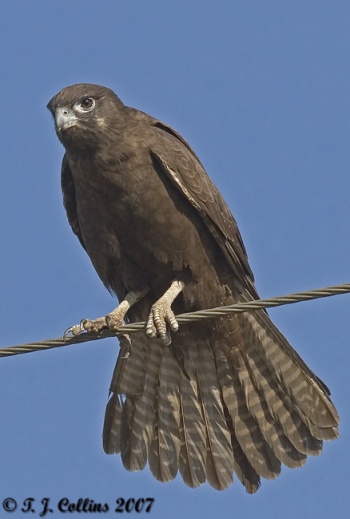(Picture of female. Attempt to disguise copied text. Taxonomy expanded. References) |
|||
| Line 1: | Line 1: | ||
| − | [[Image:Brown_Falcon.jpg|thumb|550px|right| | + | [[Image:Brown_Falcon.jpg|thumb|550px|right|Photograph by {{user|Mitcon|Mitcon}}<br />Adelaide, [[South Australia]], September 2005]] |
;[[:Category:Falco|Falco]] berigora | ;[[:Category:Falco|Falco]] berigora | ||
| − | |||
==Identification== | ==Identification== | ||
| − | 41-50cm | + | 41-50cm |
| + | *Dark brown upperparts | ||
| + | *Cream underparts | ||
| + | *Brown sides to head | ||
| + | *Tear-stripe below the eye | ||
| + | *Barred tails | ||
| + | [[Image:Brown Falcon Falco Berigora Anzac Rd 1482c 25-4-07.jpg|thumb|350px|right|Female<br />Photo by {{user|tcollins|tcollins}}<br />Darwin, [[Northern Territory]], [[Australia]], April 2007]] | ||
==Distribution== | ==Distribution== | ||
| − | [[Australasia]]: occurs over most of the continent although scarcer on the east coast. Also found on [[Tasmania]] and in southern and eastern [[New Guinea]]. Resident or nomadic. | + | [[Australasia]]: occurs over most of the continent although scarcer on the east coast. Also found on [[Tasmania]] and in southern and eastern [[New Guinea]]. |
| − | ==Taxonomy== | + | |
| − | + | Resident or nomadic. | |
| + | ==Taxonomy== | ||
| + | ====Subspecies<sup>[[#References|[1]]]</sup>==== | ||
| + | There are 3 subspecies: | ||
| + | *''F. b. novaeguineae'': | ||
| + | :*Eastern and central [[New Guinea]] and coastal northern [[Australia]] | ||
| + | *''F. b. berigora'': | ||
| + | :*[[Australia]] (except southwest) and [[Tasmania]] | ||
| + | *''F. b. occidentalis'': | ||
| + | :*South-Western and west-central [[Australia]] | ||
| + | |||
| + | Two additional subspecies ''centralia'' in the dry interior of Australia is generally considered invalid and ''tasmanica'' on Tasmania is not recognised my most authorities<sup>[[#References|[2]]]</sup>. | ||
==Habitat== | ==Habitat== | ||
Open woodland and forest edge, plains, grasslands and farmland. | Open woodland and forest edge, plains, grasslands and farmland. | ||
==Behaviour== | ==Behaviour== | ||
| + | ====Diet==== | ||
The diet includes small mammals, insects, and reptiles. | The diet includes small mammals, insects, and reptiles. | ||
| − | + | ====Breeding==== | |
| − | The nest is made from sticks. 2-6 eggs | + | The nest is made from sticks. The 2-6 eggs are incubated by both sexes for 30 days. The young fledge after a further 40-45 days. |
| − | + | ==References== | |
| + | #{{Ref-Clements6thDec09}}#Avibase | ||
| + | #Birds in Backyards | ||
| + | {{ref}} | ||
==External Links== | ==External Links== | ||
{{GSearch|Falco+berigora}} | {{GSearch|Falco+berigora}} | ||
[[Category:Birds]][[Category:Falco]] | [[Category:Birds]][[Category:Falco]] | ||
Revision as of 21:51, 10 August 2010
- Falco berigora
Identification
41-50cm
- Dark brown upperparts
- Cream underparts
- Brown sides to head
- Tear-stripe below the eye
- Barred tails
Distribution
Australasia: occurs over most of the continent although scarcer on the east coast. Also found on Tasmania and in southern and eastern New Guinea.
Resident or nomadic.
Taxonomy
Subspecies[1]
There are 3 subspecies:
- F. b. novaeguineae:
- Eastern and central New Guinea and coastal northern Australia
- F. b. berigora:
- F. b. occidentalis:
- South-Western and west-central Australia
Two additional subspecies centralia in the dry interior of Australia is generally considered invalid and tasmanica on Tasmania is not recognised my most authorities[2].
Habitat
Open woodland and forest edge, plains, grasslands and farmland.
Behaviour
Diet
The diet includes small mammals, insects, and reptiles.
Breeding
The nest is made from sticks. The 2-6 eggs are incubated by both sexes for 30 days. The young fledge after a further 40-45 days.
References
- Clements, JF. 2009. The Clements Checklist of Birds of the World. 6th ed., with updates to December 2009. Ithaca: Cornell Univ. Press. ISBN 978-0801445019.
- Avibase
- Birds in Backyards
Recommended Citation
- BirdForum Opus contributors. (2024) Brown Falcon. In: BirdForum, the forum for wild birds and birding. Retrieved 9 May 2024 from https://www.birdforum.net/opus/Brown_Falcon





